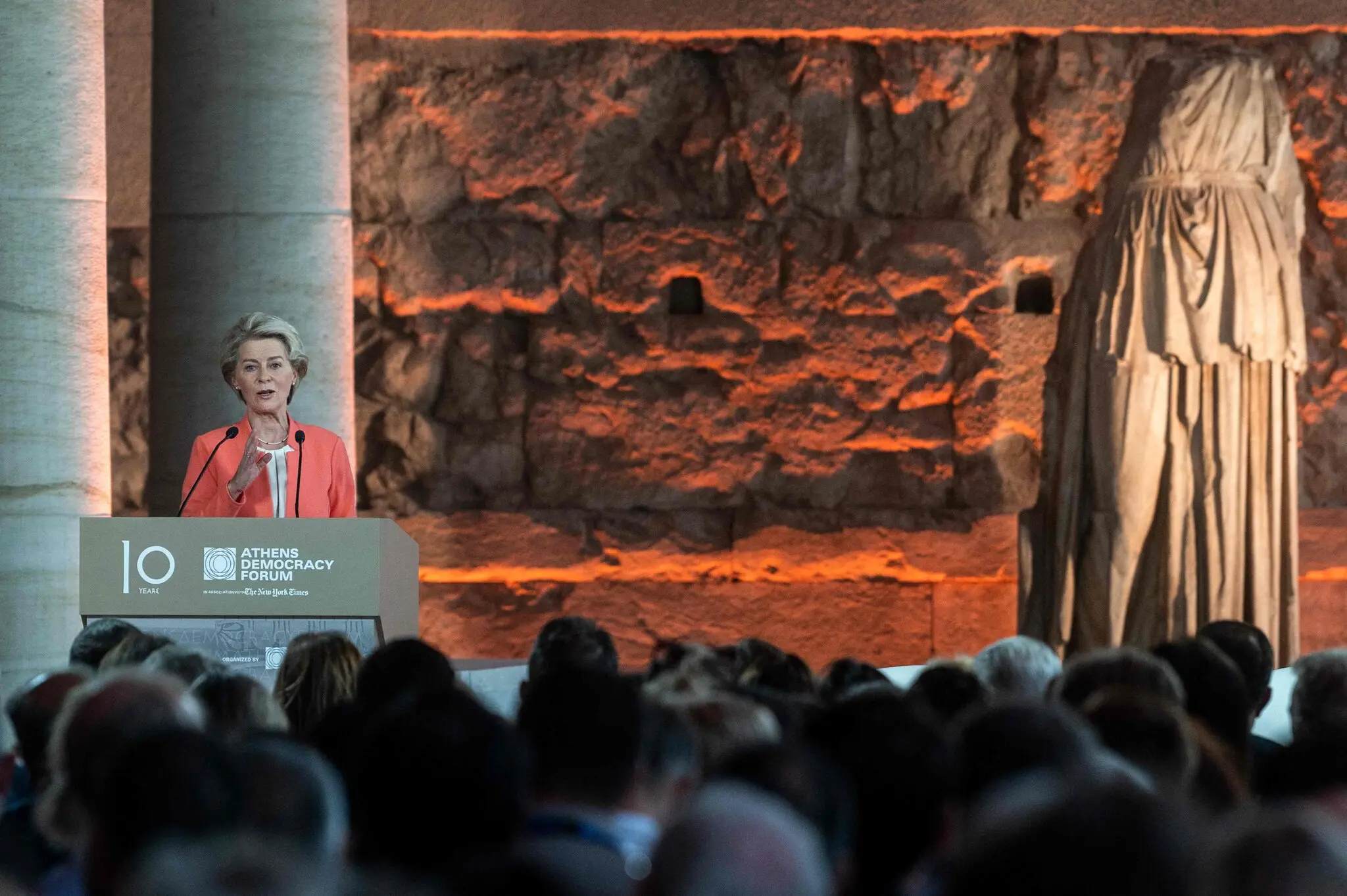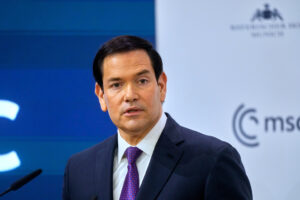Faced with Europe’s Increasing Swing to the Right, EU President Ursula von der Leyen Takes Confrontational Tone
As Italy’s recent election of a far-right leader revives memories of a not-so-distant authoritarian age, European leaders last month invoked history of another kind in Athens at the 10th annual Democracy Forum.

Image Credit: Angelos Tzortzinis/Agence France-Presse/Getty Images
(NEW YORK)––As Italy’s recent election of a far-right leader revives memories of a not-so-distant authoritarian age, European leaders last month invoked the history of another kind in Athens at the 10th annual Democracy Forum.
Standing in the Agora, not far from where Athens sat its city council, European Union President Ursula von der Leyen drew upon the long arc of history to punctuate a markedly confrontational tone in the face of rising authoritarianism throughout Europe. “For more than 70 years, our continent has marched incessantly towards democracy,” von der Leyen said in an address at the forum on Sept. 29. “And many of us started to believe that Europe and all humanity would keep advancing naturally towards freedom and peaceful cooperation. We started to take democracy for granted.” The speech came amid heightened concern as the European Union, gripped by an energy crisis and inflation, a belligerent Russia, and another pair of right-wing election wins in member states, continues to watch a descent toward authoritarianism and populism.
The Berlin-based Civil Liberties Union for Europe, a non-governmental organization that promotes civil rights in the union, concluded in a 2022 report many member states are “vandalizing or neglecting their democracies.” The Feb. 15 Liberties and Rule of Law Report singled out Hungary, Poland, and Slovenia for trends of deepening authoritarianism, and warned of trends in several Western European states of expanded COVID emergency powers, attacks against the press, and repression of minority groups. And more recently, the Italian general election on Sept. 25 saw the success of the country’s most far-right government since World War II.
John Torpey, Director of City University of New York’s European Union Studies Center and Presidential Professor of History and Sociology, said the Italian election has especially stirred anxieties within the European Union. “There’s this resonance in Italy because it’s the birthplace of fascism, in the historical sense,” Torpey said in an interview on Wednesday, Oct. 5. “There’s a lot of concern about what this new prime minister is going to do, where she is going to take Italy––there have been a lot of anti-EU animus in these kinds of parties.”
In a step away from years of calculated warnings by top European officials, von der Leyen struck a markedly confrontational tone in Athens, describing this year’s crises as only the latest iteration of what she called a centuries-long fight between authoritarianism and democracy. “Today once again, a democracy fights for its own survival against the aggression of a foreign autocrat,” von der Leyen said. “Russia’s attack against Ukraine is yet another battle in a war that has been raging for 25 centuries: the war of autocracy against democracy.” While the drumbeat of warnings and concerned speeches by European authorities has been building for years, the recent combination of economic woes, conflict with Russian President Vladimir V. Putin, and clear democratic backsliding could portend a shift in the EU’s approach.
Nick Banner, Associate Adjunct Professor in International Relations at New York University and a former UK government official who worked with the EU, said there has been a recent change in tone from EU leaders like Ursula von der Leyen. He said von der Leyen in particular has doubled down on pointedly holding member states to the conventions and commitments that undergird the European Union. “The EU has to tread quite carefully, because on the one hand, they want competent governments that will pursue sensible policies,” Banner said. “But on the other, if you go on and on about democracy, as von der Leyen does, you have to respond to the fact that this (election of far-right parties and leaders) is what people have voted for.”
While von der Leyen’s speech last week scratched a clear line in the sand between the European Union and non-democratic regimes, her admonishment touched on a deeper anxiety about whether the 27-member body can act as an effective bulwark against democratic backsliding. Coupled with the European Parliament’s threat to cut off billions in funding to Hungary, von der Leyen’s speech could signal a slightly more emboldened EU. The European Union is increasingly criticized by what some call an unwillingness to take bolder steps against its transgressor member states, while the integrity of the union still licks its wounds from Brexit.
In her speech Thursday, von der Leyen said it was sobering to see the “tragedies of the past” again in Europe, and pointed her critiques inward, saying “too many in Europe have underestimated threats inside and outside our borders.” For Torpey, democratic backsliding among European Union member states should be considered from a transatlantic context as well, pointing to the erosion in Americans’ public trust in institutions and the long shadow cast by the violent Jan. 6 insurrection. “I think this illiberal thrust is hugely important,” Torpey said. “The big takeaway is the way the right has allowed for more authoritarian parties to become more mainstreamed. You could sort of describe this in the Republican party in the U.S. as well. There’s been a lot of concern about this descent.”
Kathryn Palmer (she/her) is a Master’s student in the joint Global Journalism and French Studies program. She majored in Politics at the University of California, Santa Cruz, and has since worked as a local reporter in various media markets in Northern California.




